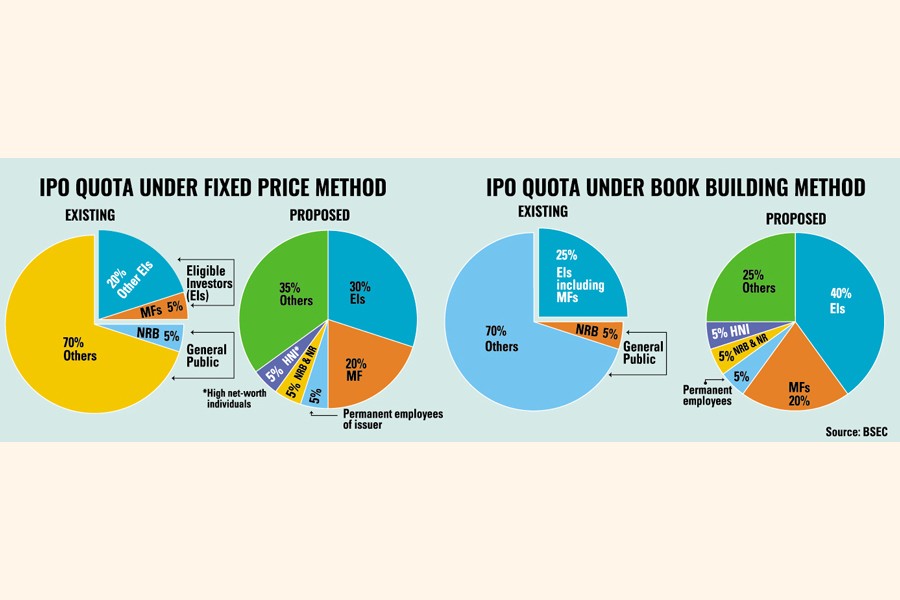Revised IPO rules carve out separate quotas for mutual funds, wealthy investors

Published :
Updated :

The securities regulator has revised the IPO (initial public offering) quota, separating mutual funds from the category of eligible investors and high-net-worth individuals from that of general investors.
The revised public issue rules, which will introduce the reclassification of investor categories, are awaiting approval pending receipt of public opinion.
As per the existing rules, eligible investors under the fixed price method are entitled to 25 per cent of primary shares, including 5 per cent for mutual funds. The remaining 75 per cent allocation goes to the general public, including 5 per cent for non-resident Bangladeshis (NRBs).
The revised rules divide half of IPO shares between eligible investors - 30 per cent - and mutual funds - 20 per cent - in listings under the fixed price method. The 20 per cent separate quota for mutual funds would also apply to listings under the book-building method.
In both the fixed price and book-building methods, the IPO share of general investors is set to shrink from 75 per cent to 50 per cent and from 75 per cent to 40 per cent, respectively.
Md. Abul Kalam, spokesperson of the Bangladesh Securities and Exchange Commission (BSEC), said the regulator had reclassified the IPO quota to diversify the country's capital market.
He rejected concerns that the primary share allocation for general investors would shrink following the enforcement of the changes.
"General people are the owners of pooled funds. That's why the quota for such funds has been expanded to benefit retail investors," he said.
But the performance of mutual funds (MFs) in the secondary market suggests that investors have lost faith in them. Financial fraud and scams committed by fund managers are among the reasons for the sector's current sorry state.
So, the question arises as to why retail investors would want to park their savings in MFs when they hardly see any return from them.
Mr. Kalam thinks that the amended mutual fund rules, which will soon come into effect, will leave no scope for manipulation.
"The asset management companies (AMCs) will not be allowed to deal with the assets [in the portfolios of mutual funds]. The reforms will inspire general investors to invest in pooled funds," Mr. Kalam said.
The existing public issue rules have no quota for foreigners. The revised ones include a 5 per cent allocation for non-resident Bangladeshis (NRBs) and non-residents (NRs). They will have to apply for IPO shares through NITA accounts.
A NITA (Non-Resident Investor's Taka Account) is a specific type of bank account in Bangladesh that allows non-resident individuals, non-resident Bangladeshis, and foreign institutions to invest in the Bangladeshi stock market using foreign currencies. These accounts are used to convert foreign currencies into Bangladeshi taka for purchasing securities, and profits can be freely remitted abroad.
The NRs are those who are not citizens of Bangladesh, including those staying in Bangladesh as foreigners with a valid passport and visa allowing them to stay in the country as workers or professionals.
Mr. Kalam said foreigners working at different embassies would be able to apply for IPO shares and that this would help diversify the capital market.
Presently, a 15 per cent quota is reserved for "employees and others." Here, employees refer to the staff of the issuer companies.
This IPO quota has been misused by influential quarters and owners of issuer companies, as the term 'others' has not been specified in the rules, Mr. Kalam said. This is the reason why the category has been changed to "permanent employees," reducing the allocation to 5 per cent from 15 per cent.
High-net-worth individuals will also have a 5 per cent quota in the revised system, separate from that of general investors, which is expected to ensure fair treatment for general investors.
IPO shares are issued on a pro-rata basis. As a result, general investors under the current rules fail to get the expected volume of shares because high-net-worth investors apply for large volumes of IPO shares.
"The revised rules will ensure greater success in the IPOs," Mr. Kalam added.
mufazzal.fe@gmail.com


 For all latest news, follow The Financial Express Google News channel.
For all latest news, follow The Financial Express Google News channel.